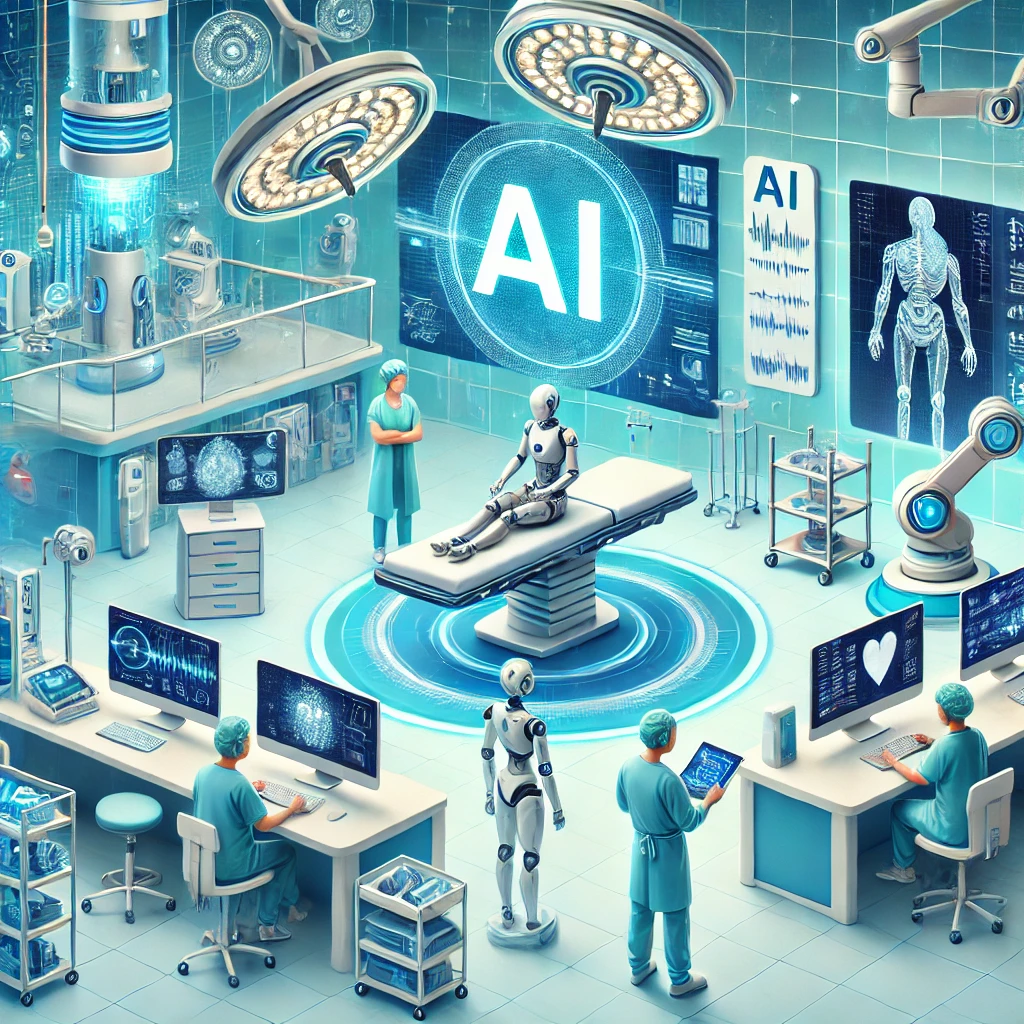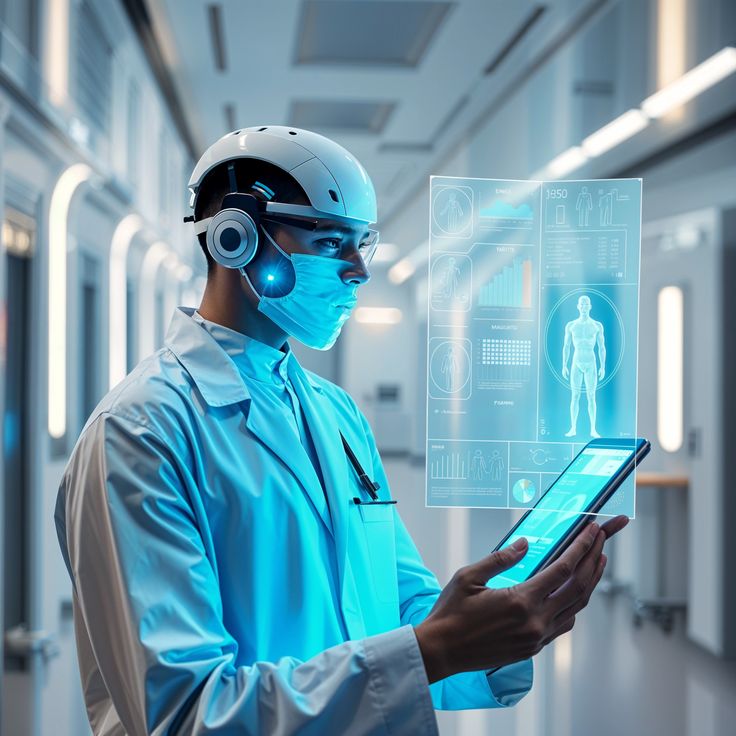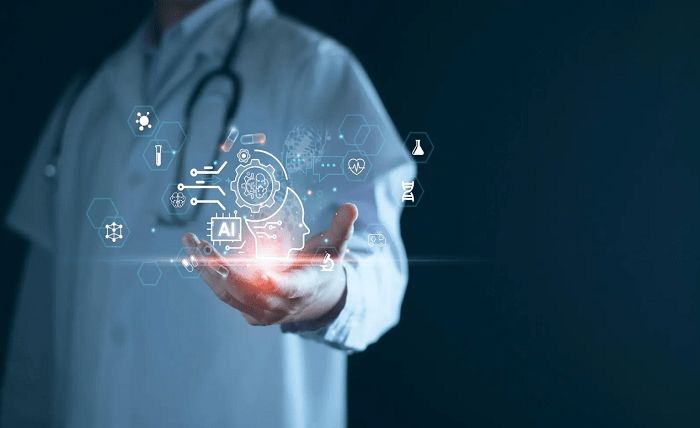Artificial Intelligence (AI) is rapidly becoming a game-changer in the medical field, bringing revolutionary advancements in how healthcare services are delivered. With the ability to analyze vast amounts of data, AI in Healthcare is helping doctors and medical professionals make more accurate diagnoses, develop personalized treatment plans, and improve patient outcomes. From detecting diseases at their earliest stages to predicting health risks, AI is transforming the landscape of healthcare by enhancing efficiency and precision across various medical specialties.
The integration of AI in healthcare is not just limited to diagnostic tools; it spans across multiple domains, including drug discovery, robotic surgery, virtual health assistants, and predictive analytics. By harnessing the power of machine learning, natural language processing, and computer vision, AI is paving the way for smarter, more efficient healthcare systems. As AI technologies continue to evolve, their impact on the medical field promises to offer even more innovative solutions, improving both the quality and accessibility of healthcare for patients worldwide.
What is AI in Healthcare?

AI in Healthcare refers to machines simulating human intelligence, enabling them to think, learn, and make decisions. In healthcare, AI is utilized to analyze medical data, assist healthcare professionals in diagnosis, and recommend personalized treatments. These systems can learn from patient history, images, genetic data, and clinical studies to make informed decisions.
How Does AI Work in Medicine?
AI works in medicine through the use of algorithms and machine learning (ML) models that process vast amounts of healthcare data. These models are trained on various types of medical records, images, and genetic information to recognize patterns and recommend treatment plans. AI can predict outcomes, recommend therapies, and even detect early signs of diseases.
Key AI Technologies Used in Healthcare
- Machine Learning (ML)
Machine Learning is a subset of AI that uses algorithms to detect patterns in data. In healthcare, ML is employed for predictive analytics, diagnosing conditions, and personalizing treatment strategies. - Natural Language Processing (NLP)
NLP enables AI systems to understand and process human language. In the medical field, NLP is used to analyze clinical notes, research papers, and patient records, providing actionable insights for diagnosis and treatment. - Computer Vision
Computer vision enables AI to interpret visual data, such as medical imaging. AI can analyze X-rays, MRIs, and CT scans with high accuracy, helping doctors detect diseases like cancer at earlier, more treatable stages. - Robotics
AI-driven robots are playing an increasingly important role in surgeries, diagnostics, and patient care. These robots offer higher precision and can perform complex tasks with minimal human intervention.
How AI is Transforming Healthcare
1. AI in Diagnosis: Improving Accuracy and Speed
AI is improving diagnostic accuracy by analyzing medical images, lab results, and patient histories. AI in Healthcare systems are trained to detect diseases such as cancer, diabetes, and heart conditions, which may be missed by human doctors.
AI’s ability to detect early-stage cancers is a prime example. With improved accuracy, doctors can offer timely treatments, significantly improving patient outcomes.
2. AI in Personalized Medicine: Tailored Treatment Plans
One of AI’s greatest advantages is its ability to personalize treatment. AI analyzes a variety of data sources, including genetic information, patient history, and lifestyle factors, to create individualized treatment plans. This ensures that patients receive the most effective therapies based on their unique characteristics.
By leveraging AI, doctors can predict how different treatments will affect a patient, resulting in better outcomes and fewer side effects.
3. AI in Drug Discovery: Accelerating Medical Advancements
AI in Healthcare is revolutionizing drug discovery by analyzing vast amounts of biological data to identify new potential drugs. AI algorithms can predict how a drug will interact with the body, accelerating clinical trials and reducing the time to bring life-saving treatments to market.
During the COVID-19 pandemic, AI played a crucial role in identifying existing drugs that could be repurposed for treatment.
4. AI in Surgery: Enhancing Precision and Efficiency
AI-powered robotics are transforming surgery by assisting in complex procedures with greater precision. Surgeons use AI to plan surgeries, minimize errors, and ensure accurate incisions. Robotic surgery platforms like the Da Vinci Surgical System are already being used in hospitals worldwide.
AI also facilitates minimally invasive surgeries, leading to quicker recovery times and better patient comfort.
5. AI in Virtual Health Assistants: Improving Patient Engagement
AI-powered virtual health assistants are helping improve patient engagement by offering 24/7 access to healthcare advice, appointment scheduling, and medication tracking. These systems help manage chronic conditions and provide answers to common health questions through chatbots.
AI can also provide reminders for medication adherence, ensuring patients stay on track with their treatment plans.
6. AI in Predictive Analytics: Preventing Diseases Before They Happen
Predictive analytics powered by AI in Healthcare is helping providers identify health risks before they become critical. By analyzing patient data, AI systems can predict diseases such as heart disease and diabetes, enabling early intervention.
For instance, AI can predict individuals at high risk of developing heart conditions, allowing healthcare providers to take preventive measures to reduce risks.
Real World Applications of AI in Healthcare

1. AI in Oncology: Early Detection of Cancer
AI is making strides in oncology by analyzing medical images for early signs of cancer. It can detect tumors in radiology images before symptoms appear, increasing the likelihood of early treatment.
Tech companies, such as Google Health, are using AI to identify breast cancer in mammograms more accurately than human radiologists, improving outcomes for patients.
2. AI in Cardiology: Monitoring Heart Health
AI is enhancing how heart conditions are diagnosed and treated. AI systems can monitor patients’ heart activity in real-time, identifying issues like arrhythmias, heart disease, and even heart attacks.
Wearable devices integrated with AI algorithms, such as smartwatches, are providing continuous heart health monitoring and alerting healthcare providers if abnormalities are detected.
3. AI in Neurology: Diagnosing Brain Disorders
In neurology, AI is improving the diagnosis of brain disorders like Alzheimer’s, Parkinson’s, and multiple sclerosis. AI tools can analyze brain scans to detect early-stage symptoms of these diseases, which may otherwise go unnoticed.
By detecting these disorders early, patients can receive interventions that improve their quality of life and prevent further progression.
4. AI in Radiology: Enhancing Image Interpretation
AI in Healthcare is improving the speed and accuracy of medical image interpretation. Algorithms can analyze X-rays, MRIs, and CT scans to detect abnormalities, such as fractures, tumors, and lung infections, with incredible precision.
Radiologists are leveraging AI tools to enhance their capabilities, reducing the chances of missing critical diagnoses.
Ethical Considerations of AI in Healthcare
While AI in Healthcare offers great potential, there are important ethical challenges to consider:
- Data Privacy: Protecting patient data is crucial, as healthcare data is highly sensitive. Strict regulations are needed to ensure AI systems safeguard patient information.
- Bias in AI: AI models are only as good as the data they are trained on. If the data is biased, AI can produce unfair or discriminatory results. Ensuring fairness is vital AI in Healthcare applications.
- Accountability: When AI makes healthcare decisions, questions arise regarding accountability. Who is responsible if an AI system incorrectly diagnoses a patient? Ensuring accountability AI in Healthcare applications is essential.
The Future of AI in Healthcare

The future of AI in healthcare looks promising. As technology advances, AI’s accuracy, accessibility, and efficiency will continue to improve. We can expect even more personalized treatment plans, enhanced diagnostic tools, and faster drug discovery.
Additionally, AI’s integration with wearable devices, electronic health records, and telemedicine will offer a seamless healthcare experience for both patients and providers.
Conclusion: Embracing AI for Better Healthcare
Artificial Intelligence is shaping the future of healthcare by making it more efficient, accurate, and personalized. From diagnosing diseases to developing treatments, AI is enhancing every aspect of healthcare. By embracing AI, the medical field is improving patient outcomes and helping healthcare providers deliver better care. As AI evolves, its role in healthcare will become even more crucial in creating a healthier future for all.
Check More
- What is the opposite of Artificial Intelligence?
- AI Generated 3D Model Compliant Mechanisms
- AI Half Burned Face: A New Era in Digital Art
- Augmented Intelligence to Improve Suicide Care
- How Kialo Uses Artificial Intelligence to Enhance Online Debates
